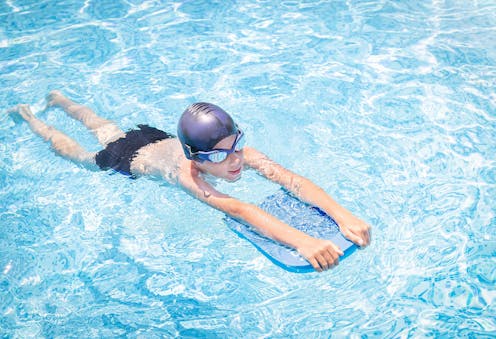Regular lessons have paused – but your kids should still practise their swimming this summer
- Written by Amy Peden, NHMRC Research Fellow, School of Population Health & co-founder UNSW Beach Safety Research Group, UNSW Sydney

Many swimming schools have temporarily closed for the summer holidays. But this doesn’t mean you should take a break from helping your kids learn how to swim.
What can you do during this period to keep your children’s swimming skills up to scratch?
Summer dangers
Remember, summer is a peak time for drowning. Australia records its highest number of drowning deaths in the warmer months and tragically, 134 lives were lost last summer.
Risk is highest at this time, as people head to the water to seek relief from the heat. The school and public holidays also mean people go to areas they are not familiar with.
Children in particular are disproportionately impacted, with their risk of drowning doubling during school holidays, compared to term time.
How to stay safe
Adults need to actively supervise young children around water. This means being within arms’ reach in the water with children under five and older if your children are non or weak swimmers.
Supervision can relax as children grow and improve their swimming. But the safest place for parents is in the water having fun with the kids.
It’s also important to remember “active supervision” means focusing all your attention on your children (so no mobile phones or multi-tasking).
Along with pool fencing and adults learning cardiopulmonary resuscitation (CPR), learning how to swim is a key strategy to reduce the risk of drowning.
This means children have the skills and knowledge to keep them safe in different water environments and scenarios.
Any swimming you do helps
Research shows any activity (even informal play) in any type of water can make a positive difference to swimming skills.
My 2016 Australian study with Royal Life Saving Society colleagues showed any time spent in the water – but ideally at least once a fortnight – is linked to higher swimming skills in children (5–12 years) already enrolled in swimming lessons.
Children with a home pool have also been found to be better swimmers than those without a pool.
Although we don’t exactly know why, this is likely due to the increased opportunity to informally practise their swimming skills. It may also be that parents are more conscientious about lessons.
Talk about water safety as well
To understand what children should be able to do by a particular age, check the National Swimming and Water Safety Framework.
This can give you ideas of things to practise and a reminder of a holistic approach to learning to swim, which includes personal survival and rescue skills. For example, by six, it is expected every Australian child should be able to enter and exit shallow water unassisted, float and recover to a standing or secure position and move continuously through the water for five metres.
Talking about water safety with your kids could include setting and reinforcing rules around the water, such as “no going near the water without an adult” or “no climbing on the pool fence”.
If you’re at the beach, always prioritise one that’s patrolled, and explain why we swim between the flags. If lifeguards can’t see you, no one can help you should you get into trouble.
Think about all types of water
With lifeguards and a controlled environment, local pools are statistically the safest places to swim.
But it is important for children to experience different swimming environments, including cold water and currents. For two decades, rivers have been the leading location for drowning in Australia.
This is why enjoying the water safely with your children this summer is a great opportunity to practise their swimming skills. Plenty of “Christmas swims” (as Bluey calls them) and water play will mean you’ll see a difference when kids head back to swimming lessons for Term 1 next year.
Authors: Amy Peden, NHMRC Research Fellow, School of Population Health & co-founder UNSW Beach Safety Research Group, UNSW Sydney



















